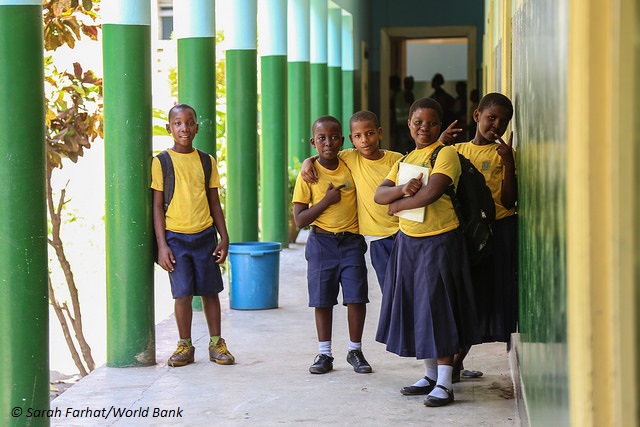By Hilaire Hounkpodoté, PASEC Coordinator

The recent edition of the SDG 4 Data Digest illustrates the range of partners working with the UNESCO Institute for Statistics (UIS) to help countries produce and use assessment data to strengthen lifelong learning. This blog highlights the work of one of these vital partners: the Conférence des Ministres de l’Éducation des États et Gouvernements de la Francophonie (CONFEMEN). CONFEMEN works with the world’s French-speaking countries to implement the Programme for the Analysis of Education Systems (PASEC), a renowned regional learning assessment.
Building a culture of assessing learning – a culture that uses the results to shape education policies and resources – is vital for the achievement of Sustainable Development Goal 4 (SDG 4): inclusive and quality education for all by 2030. But it raises a number of burning questions. How do countries create such a culture? How can it be aligned with national priorities and realities, while contributing to internationally-comparable data on learning? And most importantly, how do we measure whether children are learning?
The recent SDG 4 Data Digest, published by the UNESCO Institute for Statistics (UIS) in December, set out possible answers. This was also a welcome opportunity for us here at the Programme for the Analysis of Education Systems (PASEC) to share our thoughts and experience.
For PASEC, national ownership of the entire process is paramount, from data-gathering and analysis, to dissemination and education policymaking. As the SDG 4 Data Digest stresses, statistics on learning are vital but are only part of the picture. What matters is how they are used – particularly over time – to drive improvements for children.
PASEC measures the skills in reading and mathematics at the start and end of primary education (Grades 2 and 6) and analyses the factors that contribute to academic success to spur ideas and tangible action for improvements. It also reinforces national capacity, supporting national teams to embed the domestic and permanent human resources and skills needed for effective monitoring.
Administered by the Conférence des Ministres de l’Education des Etats et Gouvernements de la Francophonie (CONFEMEN), PASEC has supported national evaluations in more than 20 francophone countries in Africa and Asia since 1991. CONFEMEN provided a new vision for PASEC in 2012, establishing international comparative evaluations to better meet country needs. And in 2014, we carried out our first international evaluation in 10 African countries.

PASEC results confirmed a grim reality already signalled by the UIS: that around one-half of students around the world are not acquiring even basic reading and mathematics skills. In fact, the situation was even worse, with 70% of students who were starting their primary education in the 10 countries lacking the basic skills they needed to make real progress in their further schooling. For mathematics the percentage was 50%, a dire result.
The hope was that these percentages would tumble as children made their way through primary school. But by the end of primary education (Grade 6), nearly 60% of students were still below the expected skill levels in both subjects. The results demonstrate that despite impressive progress in many African countries on access to education, more schooling is not leading to more learning.
The data illuminated the factors that might drive success in reading and mathematics at the beginning and end of primary schooling, such as attending urban schools, the availability of educational resources, not repeating a grade and the literacy of parents.
One other factor that stands out is attending preschool, which helps to prepare a child for learning. The PASEC 2014 results reveal that only between 10% and 50% of students enrolled in Grade 2 in the 10 African countries had been to preschool before they started primary school. The impact can be profound: the percentage of students who attended preschool and attained the expected skill levels in reading and writing was 42%, compared to just 24% for those who never went to preschool. A closer look found that students who attended preschool were more likely to come from wealthier backgrounds and urban areas than those who did not.
We are now ready for our second round of international assessments. PASEC2019 will expand the original 10 African countries to 15 and will introduce a new in-depth survey of teachers. As the SDG 4 Data Digest shows, PASEC data document a crisis in the foundational years of education, with a lack of preschooling to prepare children for the first grades of primary school, a continuing tendency for children to repeat grades, wasted resources and low learning levels working in combination to fuel the global learning crisis.
If current trends continue, this has serious implications for the achievement of SDG Indicator 4.1.1(a): proportion of children and young people in Grade 2 or 3 achieving at least a minimum proficiency level in reading and mathematics. The good news is that the UIS is developing a methodology for this indicator in response to feedback from the Inter-Agency and Expert Group on SDG Indicators (IAEG-SDGs) and Member States, backed by comprehensive work plans. CONFEMEN and other partners will be able to contribute to reflection on the comparison of results at the global level.
PASEC (and other regional and international efforts) show what is possible and help us understand the dynamics of the foundation years of education. These years are critical if we are to achieve not only higher rates of primary school completion, but also higher levels of learning.
About the Author
Hilaire Hounkpodoté is Coordinator of the Programme d’Analyse des Systèmes Éducatifs (PASEC) of the Conférence des ministres de l’Education des Etats et gouvernements de la Francophonie (CONFEMEN). Previously, he worked on learning assessment in Mali and the Democratic Republic of Congo and has been a technical advisor for PASEC. Mr. Hounkpodoté is an Economic Statistician Engineer and graduated from the École Nationale Supérieure de Statistique et d'Économie Appliquée (ENSEA) in Abidjan. Email: hhilaire@confemen.org Twitter: @HounkpodoteH
Leave a comment